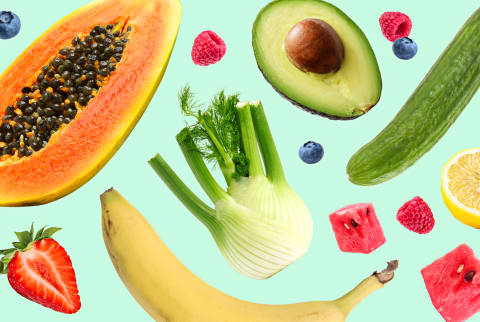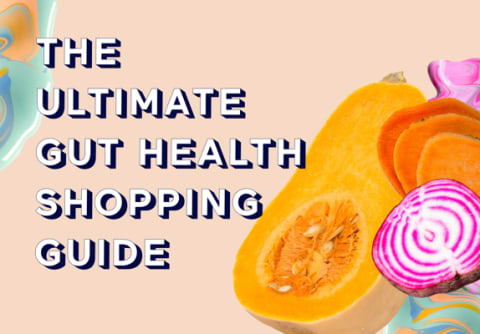Advertisement
18 Foods To Add To Your Diet When You Start Feeling Bloated



Even the healthiest among us suffer from bloating every now and then. Generally, you can quell the uncomfortable—and sometimes painful—stomach swelling through hydration, probiotic supplements, and certain exercises. Another way to help reduce bloating, though, is with your diet.
These 18 foods have properties that may support a healthy gut, fight inflammation, balance fluid and sodium levels, and keep you hydrated—all factors that help manage bloat:
Cucumber
"Cucumber is an anti-bloat superfood1," registered dietitian Jess Cording, M.S., R.D., CDN, says, "thanks to the silica, caffeic acid, and vitamin C in there, all of which help reduce swelling and discourage water retention."
Avocado
Pairing avocado with salty food can help reduce sodium-induced bloat. This is because avocado is high in potassium, which helps balance sodium2 levels.
"They also contain fiber (one medium avocado has 9 grams of fiber or 35% of your recommended daily intake)," integrative gastroenterologist Marvin Singh, M.D., says, "which helps feed the trillions of bacteria in the gut."
Kimchi
Fermented foods, like kimchi "contain live, beneficial microbes that will settle happily into your ecosystem," naturopathic doctor Kellyann Petrucci, M.S., N.D., tells mbg. Along with "helping to build a diverse and well-balanced microbiome," the probiotics in kimchi help manage bloat and gas.
Oatmeal
Oatmeal is whole grain, meaning it's high in both soluble and insoluble fiber. In fact, just one cup of oats contains 16 grams of fiber, which is a great way to activate your digestive system first thing in the morning.
Berries
Blueberries, blackberries, and raspberries are all high in dietary fiber and polyphenols to support gut health. And a gut that's running smoothly is more likely to maintain regular bowel movements and keep bloat at bay.
Watermelon
Watermelons are made up of around 91% water, and according to integrative medicine doctor Bindiya Gandhi, M.D., "Increasing your water intake will help regulate your electrolytes and decrease fluid retention and bloating."
Bananas
The potassium in bananas does more than ease muscle cramps—it can also reduce bloat by regulating sodium balance. Slightly underripe bananas also contain prebiotic fiber, which can help support healthy digestion. One small study further found that women who ate one banana experienced significantly lower bloating levels3.
Papaya
Papaya contains a digestive enzyme called papain, which helps break down proteins in the GI tract. The fruit's enzymes help relieve symptoms of constipation and bloating4, according to one study.
Asparagus
Cording calls asparagus a "particularly powerful bloat-fighting food thanks to the amino acid asparagine." Asparagine acts as a natural diuretic, flushing excess fluid and salt out of the body.
Oranges
Oranges, and other citrus fruits, contain a flavonoid called naringenin. According to studies on mice, this flavonoid may act as a laxative5, reducing constipation and bloat. They're also high in fiber and potassium.
Warm lemon water
Drinking warm water with lemon—especially first thing in the morning—may help reduce bloat and encourage bowel movements. The temperature of the liquid has been shown to stimulate the GI tract and promote motility6. According to the Centers for Disease Control (CDC), adding lemon "can help improve the taste and help you drink more water7 than you usually do."
Fennel
Fennel is commonly used to support GI health. "Volatile oil compounds found in the leaf, stem, fruit, and seed of this plant have been studied for their ability to effectively clear intestinal gas," Emily Kyle, R.D., explains. "These compounds are also thought to stimulate bile for better digestion, thus providing relief and preventing bloating from happening in the first place."
Kiwi
Ginger
Integrative internist Vincent Pedre, M.D., calls ginger the No. 1 food for eliminating bloat. It does this "by promoting peristalsis (the rhythmic contractions of the intestines)," he explains. "It also reduces inflammation and promotes intestinal motility."
Yogurt
Yogurt is one of the most well-known probiotic foods, and it's rich in gut-friendly bacteria. Unless you're lactose intolerant, yogurt will "promote good digestion and fight swelling and bloat," Cording says.
For anyone sensitive to dairy, she recommends kefir, which is almost lactose-free.
Cantaloupe
Just like watermelon, cantaloupe is primarily made of water. It's also high in fiber and potassium9. The hydrating and digestive effects of these nutrients make cantaloupe very helpful for bloating.
Sweet potatoes
Like avocados, sweet potatoes also contain high levels of potassium (one medium sweet potato has 538 mg10), which can help flush out excess sodium. They're also high in antioxidants11, which may reduce inflammation that leads to bloating.
Spinach
Spinach is a magnesium-rich food that can help reduce bloating. "Magnesium decreases fluid retention, which can be the reason for bloating in the first place," functional medicine doctor Robin Berzin, M.D., says. "Enough magnesium will stimulate a bowel movement by relaxing the muscles and pulling water into the intestines."
11 Sources
- https://www.ncbi.nlm.nih.gov/pubmed/23098877
- https://www.cdc.gov/salt/potassium.htm
- https://www.ncbi.nlm.nih.gov/pubmed/21524710
- https://www.ncbi.nlm.nih.gov/pubmed/23524622
- https://www.ncbi.nlm.nih.gov/pmc/articles/PMC5752176/
- https://www.ncbi.nlm.nih.gov/pubmed/27684632
- https://www.cdc.gov/healthywater/drinking/nutrition/index.html
- https://www.ncbi.nlm.nih.gov/pubmed/23394986
- https://fdc.nal.usda.gov/fdc-app.html#/food-details/746770/nutrients
- https://fdc.nal.usda.gov/fdc-app.html#/food-details/168482/nutrients
- https://www.ncbi.nlm.nih.gov/pubmed/20629859

Why Nutrition Is Key To Changing Your Relationship With Alcohol
Brooke Scheller, DCN, CNS

Why Alcohol Sabotages Your Gut Health & How To Get Back On Track
Brooke Scheller, DCN, CNS

Why Nutrition Is Key To Changing Your Relationship With Alcohol
Brooke Scheller, DCN, CNS

Why Alcohol Sabotages Your Gut Health & How To Get Back On Track
Brooke Scheller, DCN, CNS

Why Nutrition Is Key To Changing Your Relationship With Alcohol
Brooke Scheller, DCN, CNS

Why Alcohol Sabotages Your Gut Health & How To Get Back On Track
Brooke Scheller, DCN, CNS

Why Nutrition Is Key To Changing Your Relationship With Alcohol
Brooke Scheller, DCN, CNS

Why Alcohol Sabotages Your Gut Health & How To Get Back On Track
Brooke Scheller, DCN, CNS















